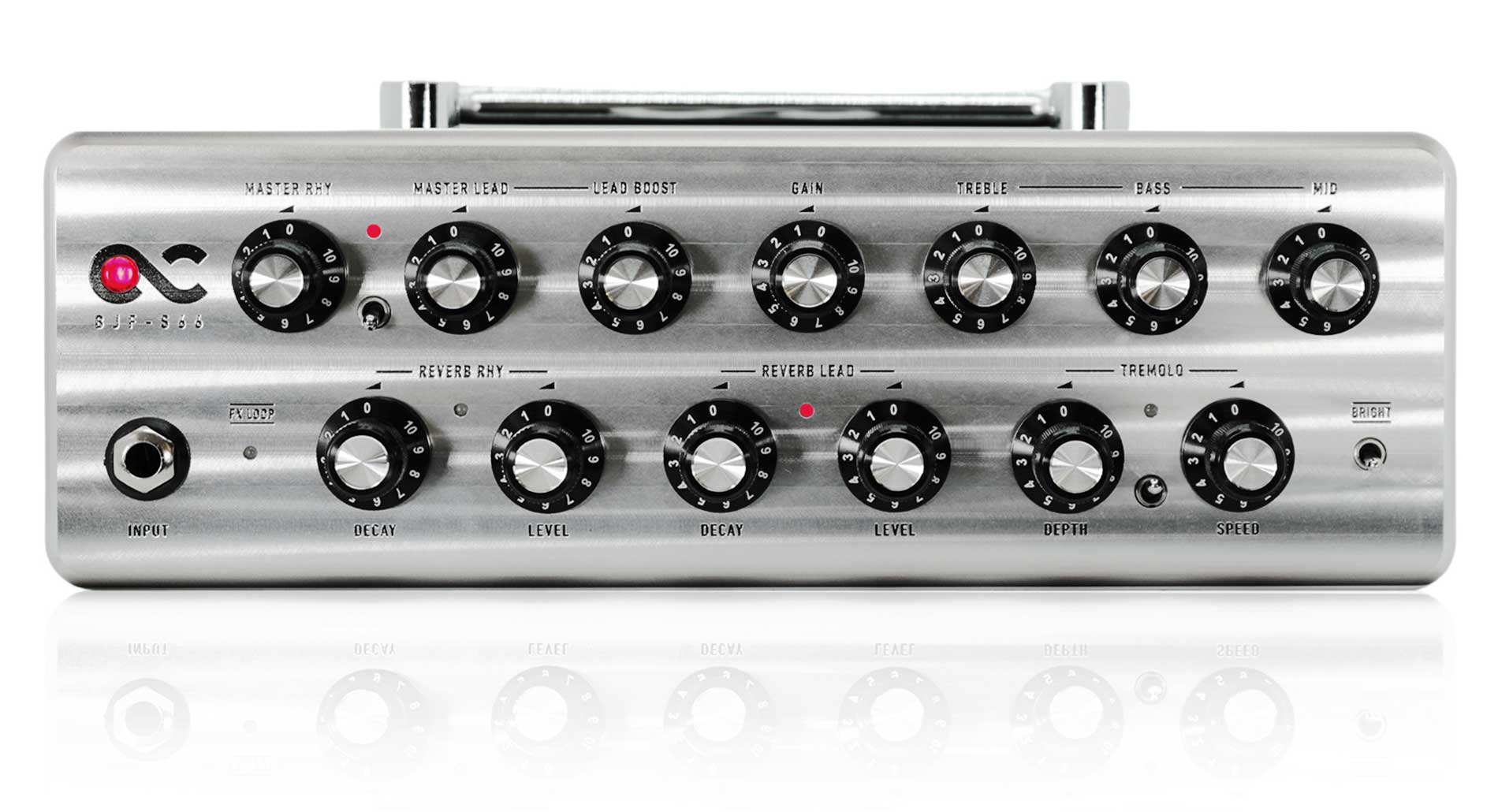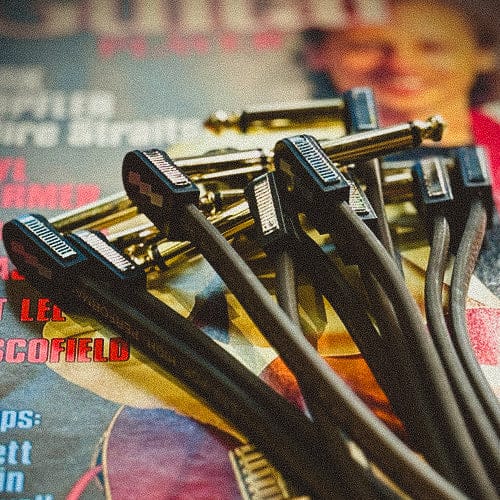One Control BJF-S66 Amp
Think of this as the best sounding American amp you have ever played. At any volume. And you can keep it in your gig bag.
It sounds ridiculous but please, come by us and play it.
Don't forget to order the footswitch if you need it, it comes without footswitch
Many a wise guitarist has discovered that the amplifier can be the most important and significant part of the entire tonal chain in determining the overall quality of guitar sound. A well-known guitar tone connoisseur once “sat in” on a jam session that was hosted by another tone-fiend player, and observed that the host was playing a Squier Stratocaster, while he himself had a beautiful vintage Stratocaster with the original pickups and electronics. However, the hosting player also had an amazing sounding 1966 amplifier that was made in Fullerton California with the legendary “blackface” graphics and 40 watts of tone through 4x10 speakers. Our vintage-snob player friend soon discovered that his guitar (worth $10,000 more than his friends humble Squier model) made very little difference plugged into the blackface amplifier.
The One Control BJF-S66 is the very first all solid-state design by amp guru Bjorn Juhl from BJFe. Bjorn has crafted and designed amplifiers for famous players and studio cats all over the world, but his hand-made amplifiers have been at a price point that has put them out of reach of all but the most well-heeled guitarists. While many purists will not consider a solid-state based amplifier design, Bjorn has never been beholden to any specific design philosophy that is tied to parts as “mojo components”, instead always using the functions of various parts to suit his design rather than letting the parts dictate the sound.
One discrete all analog signal path preamp that is configured as two switchable channels, each with reverb level and decay. The reverb can be set up per channel, along with a fully switchable effects loop and tremolo that can be assigned via intelligent footswitch to either channel. Up to 100 watts of output power depending on load impedance. And tone from the mind of one of the most prolific boutique amplifier and effects designers of the past three decades. Tone that stays consistently amazing no matter where the master volume is set, making everyone from your soundman to your landlord happy.
For this first One Control guitar amplifier, Bjorn has selected the black faced amplifier from 1966 with built in reverb & trem from Fullerton California as his tonal palette. This amp is legendary for being a great “plug n play” amplifier, as well as a fantastic pedal platform for those guitarists who like to have a lot of tonal variety at their feet. With modern design and build techniques, this new amplifier is small and light enough to fit into a gig bag, yet robust enough to handle nearly any gig you can bring it to. Congratulate yourself on selecting one of the best amplifiers one can find on the market today, designed by one of the most meticulous analog electronics gurus on the face of the earth. The One Control BJF-S66 is yours.
Specifications:
- Power requirements: Included switching mode supply works worldwide with any input voltage higher than 40 Volts.
- Input impedance: 1 MegOhm
- Power Output: 66 watts into 8 Ohms, 100 watts into 4 Ohms.
- Effects Loop Send and Return: Switchable with footswitch which can remember what channel or both it is assigned to.
- EQ: Common to both channels.
- Bass: 70Hz +-20dB
- Mid: 450Hz +- 10dB
- Treble: 2KHz +-20dB
- Bright switch: +10dB at 4KHz - Bright switch is tuned to avoid tinnitus- inducing treble
- Channel Switching: Channels are switchable via footswitch, and each channel has dedicated reverb controls for level and decay.
- Rhythm Channel has Gain and Master and Reverb Level and Reverb Decay.
- Lead channel has Gain and Master and Reverb Level and Reverb Decay.
- Tremolo has depth and speed controls and is switchable via footswitch and can be assigned to either channel or both or manually switched on/off.
- The footswitch draws power from the amplifier and contains a memory of last setting.
- Power amp is a Class D design and is highly power efficient.
- Reverb is a digital BJF design.
- Preamp is a discrete solid state all analog signal path for pure tone.
Bjorns Take:
Welcome to my newest amplifier, the One Control BJF-S66.
The amplifiers that influenced the design for this amp are the classic mid 60’s high powered tube amps. This allows playing feel to be set comfortably at any volume and distortion to be set at any volume. Tremolo is placed after reverb to allow tremolo to modulate the reverb tail. The tremolo modulation has been designed to be close to perfect sine for an even sounding hypnotic effect. This means that if the sound of this amp is mostly inspired by black amplifiers of the 60’s, the tremolo sound is more similar to brown amplifiers of the 50’s.
The Preamp and Power amp stages each replicate circuit responses that occur in a tube amplifier. The functions in real tube amps take into account the small distortions that that are almost imperceptible as distortion by the human ear, and the onset of distortion is set gradually - increasing in the same way as similar amp with tube amplifiers. For the channel switching, I have made a departure from standard designs - I thought long and hard about hardwiring the gain for rhythm so it would be on max when in Lead mode but something useful is to set the rhythm gain at 6 and then switch channels so you can have about the same sound plus you can set the output level of each channel with respective master volume as well as set two independent reverb levels. The channel footswitch changes the master volume and kicks in the lead boost and selects channel reverb controls. For musicians, the amp is pretty straight forward with the exception that some would expect to have dedicated gain controls; but once you look deeper into possible use of the amplifier, it makes sense.
The OC BJF-S66 was originally designed to work with the Eminence Allessandro Speaker, because this speaker provides ”Twang”*, and as speakers are half the sound, this is to give it the correct vintage EQ and partly the playing feel. That said, the BJF-S66 amplifier can work with most any speaker, though the exact intended vintage feel will not be quite as prominent. Note that the output power is about 66 watts into 8 Ohms and 100 watts into 4 Ohms and a mere 30 watts into 16 Ohms, so output behaves like a solid state power amp. NEVER short-circuit output or damage will occur! But you can leave the output disconnected and use the preamp via the effects loop send jack for direct recording or to drive other signal chains. (On tube amps: NEVER leave the output open!)
Premier Guitar Magazine published an article by me entitled “A Mad Professor Speaks on Speakers”. This is the article that I quoted to support the choice of the Allessandro speaker which is a really fantastic speaker, making it a breeze to design an amp backwards from speaker to input.
About speaker choices - the BJF-S66 can absolutely use a number of speakers although it should be remembered that speakers are half of your sound. For instance, the BJF-S66 sounds excellent with a Celestion Vintage 30, which is likely the world’s most common speaker. Soundwise, this will make the amp sound more like Mike Landau’s signature Fender Hot Rod Deluxe than a vintage 60’s blackface model.
The BJF-S66 amp is a bold move forward into whether transistors can be made to sound like tubes.
I profess to say that if the desired functions can be defined, then these functions can be created and then one must first answer what is desirable to the ear. The BJF-S66 draws functions from an array of amplifiers of the mid 60’s isolating functions that have been desirable, including the sounds produced after aging components and much more as it also draws influences from sounds produced only at certain power levels. This amp is therefore also an entry in the debate whether great sounds can only be obtained at very loud levels. I profess to say that if the desired functions can be defined, then the feel can be replicated; but to be really true, the speaker cone must be able to move. However, that would make it possible to get playing feel allegedly only obtainable at 100W’s at 1W.
Though this amp is made to do vintage sounds, it has many modern features to make life easier for musicians. The range of controls have been defined to both be familiar to musicians but also intuitive to musicians
(* twang as a sound quality is a certain protruding upper midrange)
Note: BJF-S66 has so far replaced both a JCM 900 half-stack and a Twin Reverb on a major stage where both the musician felt better AND the soundman felt it easier to get a great sound, with the audience enjoying the overall sound of the band more.
Det gick inte att ladda upphämtningsinformation
Vid köp över 1500 SEK (gäller ej skrymmande)
Vi skickar samma dag om ordern är lagd innan kl 12:00 CET
Byt eller pengarna tillbaka

One Control BJF-S66 Amp






